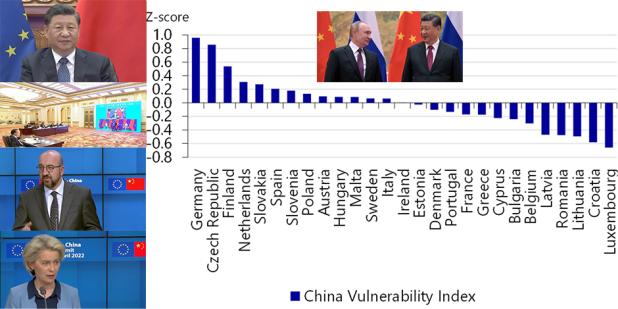Join us for a free one-day workshop for educators at the Japanese American National Museum, hosted by the USC U.S.-China Institute and the National Consortium for Teaching about Asia. This workshop will include a guided tour of the beloved exhibition Common Ground: The Heart of Community, slated to close permanently in January 2025. Following the tour, learn strategies for engaging students in the primary source artifacts, images, and documents found in JANM’s vast collection and discover classroom-ready resources to support teaching and learning about the Japanese American experience.
Heribert Dieter: Europe and China and the Changing Geopolitical Environment
Tensions evident in the recent European Union-China virtual summit reflect the increasing skepticism in Europe toward China and the worries over Ukraine and economic ties as well as human rights and environmental issues.

Watch Dr. Dieter's presentation (USCI | YouTube)
For decades, European countries assumed that China is a benign force in international relations. European governments are revising their perceptions of China. One of the biggest obstacles to a more cautious policy towards Beijing was Angela Merkel's government. She insisted that business trumps politics. Her departure has marked the beginning of a new era. In particular the Greens have been insisting on a more critical approach towards the PRC. The Russian invasion in Ukraine has further fueled the skepticism towards deep co-operation with authoritarian China. Germany's China policy is central since Germany exports more to China than the next ten European Union member countries combined.
At the same time, Europe's companies have become more cautious and are no longer as eager to do business in China as in the past. Three factors ought to be considered: First, China has become too expensive due to the relatively high level of wages. Second, the new economic policies of the Communist Party emphasize domestic production and show China returning to an inward looking economic policy. Third, the disruption of supply chains has alerted managers. The high cost of shipping has at least temporarily eroded the cost advantage China used to have.
European countries are working to define their position in the new geopolitical climate. Whereas before the war in Ukraine there was a tendency to muddle through and avoid policies that could be considered hostile by Beijing, the mood has swung towards a more self-confident approach. Whether the current policy will continue if the combined effects of massive immigration from Ukraine and potentially Russia, inflation and economic stagnation will hit European economies is difficult to forecast.
 Heribert Dieter is a senior fellow at the German Institute for International and Security Affairs, Berlin and visiting professor for International Political Economy at Zeppelin University, Lake Constance. Since 2017, he is also an associate professor at Potsdam University. He was previously a visiting professor at the University of Hong Kong and served as Director of Policy Research at the Asia Global Institute. Dieter has published eight monographs and seven edited volumes, primarily on international economic relations and regional integration. His research focuses on international trade and finance. The future of the multilateral trading system and the stability of the international financial system have been key questions in his research. In addition, he has worked on regional integration in Europe and the Asia-Pacific, particularly on supranational financial co-operation. In his current research, he analyses the rise of China.
Heribert Dieter is a senior fellow at the German Institute for International and Security Affairs, Berlin and visiting professor for International Political Economy at Zeppelin University, Lake Constance. Since 2017, he is also an associate professor at Potsdam University. He was previously a visiting professor at the University of Hong Kong and served as Director of Policy Research at the Asia Global Institute. Dieter has published eight monographs and seven edited volumes, primarily on international economic relations and regional integration. His research focuses on international trade and finance. The future of the multilateral trading system and the stability of the international financial system have been key questions in his research. In addition, he has worked on regional integration in Europe and the Asia-Pacific, particularly on supranational financial co-operation. In his current research, he analyses the rise of China.
Sponsored by the USC Center for International Studies and the USC U.S.-China Institute.
Image: Xi Jinping, Li Keqiang, Charles Michel, Ursula von der Leyen from their virtual summit and press conference on April 1, 2022. Vladimir Putin and Xi Jinping from February4, 2022. China Vulnerability Index chart from Rabobank, August 2021.
Featured Articles
Please join us for the Grad Mixer! Hosted by USC Annenberg Office of International Affairs, Enjoy food, drink and conversation with fellow students across USC Annenberg. Graduate students from any field are welcome to join, so it is a great opportunity to meet fellow students with IR/foreign policy-related research topics and interests.
RSVP link: https://forms.gle/1zer188RE9dCS6Ho6
Events
Hosted by USC Annenberg Office of International Affairs, enjoy food, drink and conversation with fellow international students.
Join us for an in-person conversation on Thursday, November 7th at 4pm with author David M. Lampton as he discusses his new book, Living U.S.-China Relations: From Cold War to Cold War. The book examines the history of U.S.-China relations across eight U.S. presidential administrations.




